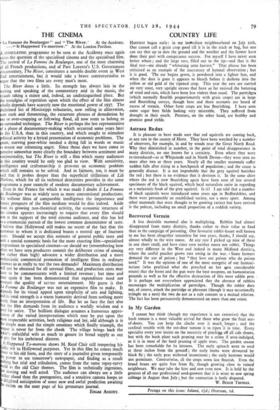THE CINEMA
La Femme du Boulanger " and " The River.' At the Academy. It Happened To-morrow." At the London Pavilion.
A STIMULATING programme to be seen at the Academy once again raises the question of the specialised cinema and the specialised film. The revival of La Femme du Boulanger, one of the most charming of all French productions, and of Pare Lorentz's U.S. Government documentary, The River, constitutes a notable double event in West End entertainment, but it would take a brave controversialist to argue that the two films are every man's meat.
The River dates a little. Its strength has always lain in the
riting and speaking of the commentary and in the music, the 'isuals taking a minor and, indeed, an undistinguished place. But he nostalgias of repetition upon which the effect of the film almost vholly depends have scarcely now the emotional power of 1937. The eclaimed list of Mississippi tributaries, now rolling in alliteration, ow stark and threatening, the recurrent phrases of denudation by
e or over-cropping or following flood, all now seem to belong to n outmoded technique. The River is perhaps the last representative if a phase of documentary-making which occurred some years later n the U.S.A. than in this country, and which sought to stimulate lineal activity by a lyrical presentation of economic problems. The :aunt, starving poor-white needed a dying fall in words or music o arouse our reforming anger. Since those days we have come to erceive somewhat more clearly the boundary between sentiment and entimentality, but The River is still a film which many audiences n this country would be only too glad to view. With sensitivity, ntelligence and craftsmanship it presents an economic problem .hich still remains to be solved. And in fairness, too, it must be aid that it probes deeper than the superficial titillations of Lili larlene, which for all its technical dexterities provides in the same rogramme a poor example of modern documentary achievement.
Even in the France for which it was made I doubt if La Femme u Boulanger was as widely seen as more conventional productions.
et without films of comparable intelligence the importance and uture prospects of the film medium would be dim indeed. Aside rom its growing non-theatrical activity, the economic structure of e cinema appears increasingly to require that every film should an at the support of the total cinema audience, and this has led
o a commercial pursuit of the lowest common denominator of taste.
believe that Hollywood still makes no secret of the fact that the ustomer to whom it is dedicated boasts a mental age of fourteen ears. Should we accept this estimate of general public taste and eek a special economic basis for the more exacting film—specialised 'rogrammes in specialised cinemas—or should we (remembering how ften we have seen producers commit the deliberate crime of aiming ow rather than high) advocate a wider distribution and a more nthusiastic commercial promotion of intelligent films in ordinary nemas so as really to test the two demands? Maximum distribution ill not be obtained for all unusual films, and production costs may ave to be commensurate with a limited revenue ; but time and me again it has been demonstrated that expenditure need not easure the quality of screen entertainment. My guess is that Femme du Boulanger was not an expensive film to make. It epends for its visual appeal upon simplicity of sets and lighting, nd its total strength is a warm humanity derived from nothing more ostly than an interpretation of life. But let us face the fact also at the film demands from its audience a worldly wisdom and a sue for satire. The brilliant dialogue assumes a humorous appre-
ation of the varied interpretations which may be put upon the ost respectable activities, both religious and lay, and although it is
e simple man and the simple emotions which finally triumph, the 'ague is never far from the cheek The village brings back the aker's unfaithful wife as much to ,insure its bread supply as out
pity for his inebriated distress.
It Happened To-morrow shows M. Rene Clair still tempering his attic wit to Hollywood purposes. Yet in this film he comes much loser to his old form, and the story of a journalist given temporarily e power to see tomorrow's newspaper, and finding as a result thing but trial and tribulation, comes from the same topsy-turvy odd as the old Clair themes. The film is technically ingenious, st moving and well acted. The audience can always see a little niter ahead than the protagonists, and a sensitive camera keeps us delighted anticipation of some new and awful prediction awaiting 'e victim on the next page of his premature journal.
EDGAR ANSTEY.


























 Previous page
Previous page